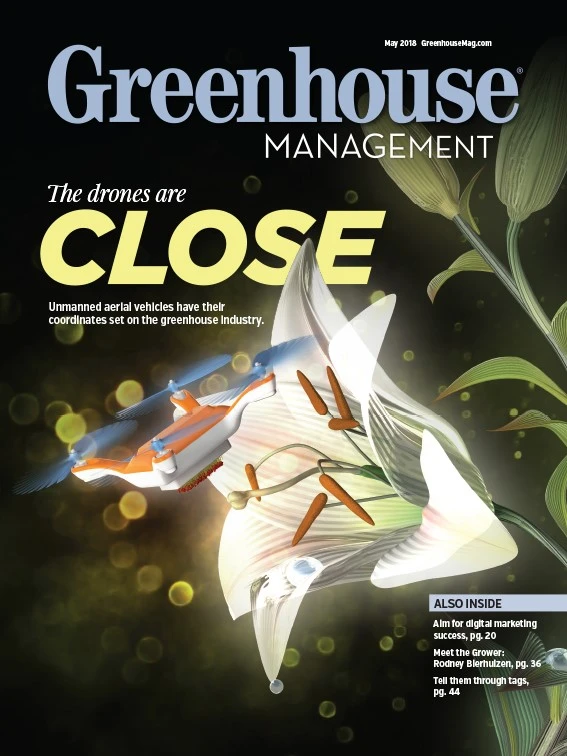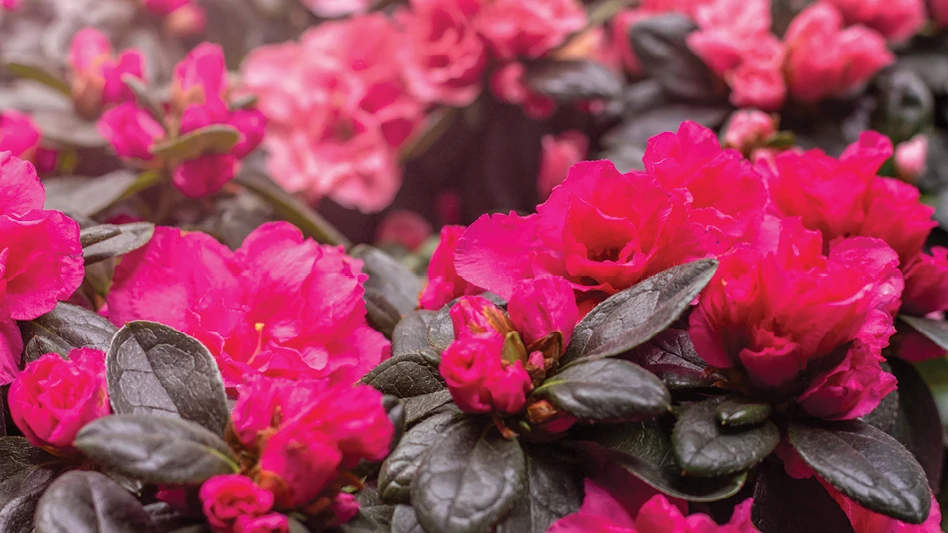
Ever since he started picking tomatoes in his parents’ greenhouse around age 5, Rodney Bierhuizen knew he wanted to be in the family business. Today, as owner and general manager of Sunrise Greenhouses Ltd., he’s carrying on the family tradition by developing new varieties and cutting-edge technologies to differentiate the business from other wholesale potted plant growers.
Rodney’s parents, Robert and Francis Bierhuizen, emigrated from Holland to Canada in 1977. Leveraging his horticulture education and greenhouse experience from the Netherlands, Robert began working in the industry right away, and then started Sunrise Greenhouses in St. Catharines, Ontario, 1982. In the late ’80s, the business moved to Vineland Station, Ontario, where the family now manages over 200,000 square feet of production space.
After growing up in the family business, Rodney Bierhuizen pursued an internship at Jeffery’s Greenhouses, a nearby bedding plant grower, during high school. He went on to study horticulture at Temple University, where he graduated at the top of his class. After spending a year in Europe — where he worked with growers in Holland and Denmark — Bierhuizen joined Sunrise in 2003.
“The nice thing about greenhouses is: Every day is different,” says Bierhuizen, who’s also chairman of the Ontario Flower Growers Co-operative and a member of the Flowers Canada board of directors. “You’re always doing something different — like a jack of all trades.”
New niche products
“Different” has always been the goal at Sunrise Greenhouses.
“The focus all along has been on niche products — different products from what other growers were producing,” Bierhuizen says. “We’re always looking for new, unique, challenging items to differentiate the business.”
Specializing in potted plant production, Sunrise grows mini roses, Easter lilies, chrysanthemums, caladiums and campanula for the wholesale market. Many of its product lines, such as campanula, are exclusive to Sunrise in North America.

“We always have a 10-year plan for development of new crops — either working with breeders from around the world or developing our own varieties in-house,” says Bierhuizen, who’s currently working with breeders in Israel, Holland and Europe. “We used to go out and search for new opportunities, but these days, it’s more of the reverse, where people approach us to bring products to the North American market.”
Sunrise has a longstanding relationship with the nearby Vineland Research and Innovation Centre, where Robert served on the board of directors. They partnered together to develop the Pixie Grape — a naturally occurring dwarf mutation of Pinot Meunier grapes traditionally used to produce champagne. Since launching the ornamental dwarf vine in 2012, Sunrise has continued collaborating with Vineland to develop new varieties of Pixie Grapes that are grown around the world.
Though new crop innovations and collaborations could stretch Sunrise into new plant categories, Bierhuizen remains focused on the company’s core.
“Right now, we have so much immediate demand for potted plants that we need to really focus on potted plants,” Bierhuizen says. “That is the foundation for the business, and we need to make sure that we keep our current customer base happy.”
Automation innovation
Bierhuizen doesn’t just share his dad’s penchant for plant production; he also inherited Robert’s forward-thinking vision for leveraging automation technology in the greenhouse.
“We’ve always tried to implement the most current technologies,” Bierhuizen says. “The majority of our facility has mobile benches, and all spacing and potting is managed by robots. Now, we’ve just added a six-axis robot, which we developed in-house for our planting line.”
Last fall, Bierhuizen took a course on programmable logic controller (PLC) programming, so he could learn to program the six-axis robot, which he designed and fabricated himself. “The challenge with this type of equipment is when it breaks down, it can be difficult to get service technicians in immediately,” he says, “so you need to understand how to fix it.” Eventually, this robot will also help automate sticking, trimming, sorting, packaging and other repetitive tasks in the greenhouse.Sunrise is also partnering with the Vineland Research and Innovation Centre to develop a predictive irrigation system. This technology will track variables like temperature, humidity and light exposure through hyperspectral cameras and other sensors, and then use an algorithm to predict when plants require water.

“In the future, irrigation will be 100 percent automated,” Bierhuizen says. “We’re always looking for ways to improve, move forward, and be more efficient.”
Busy business
Bierhuizen’s parents are still involved in the business — his mother in bookkeeping and his father in maintenance and special projects, like automating the irrigation system. His sister Chandra serves as sales and marketing manager. Sunrise employs between 20 and 40 employees seasonally — including two assistant growers. (Bierhuizen is currently working to replace a grower who recently retired after more than 30 years at Sunrise.)
With a passion for growing quality plants more efficiently, Bierhuizen leads his team toward new niche crops and advanced growing technologies. He’s always busy doing something — and that’s his advice to other growers.
“The best advice I ever got when facing a crop challenge was to do something,” he says. “Whether it’s the right thing or the wrong thing, just do something. At least at the end of the day, you can say you tried.”

Explore the May 2018 Issue
Check out more from this issue and find your next story to read.
Latest from Greenhouse Management
- Growing enlightened
- American Floral Endowment awards 17 organizations $60,700 in educational grants
- Floral businesses invited to join Society of American Florists' Petal It Forward event in October
- Bioline AgroSciences acquires Viridaxis to strengthen leadership in aphids biocontrol
- Ryley Leech joins JumpLights as vice president of sales
- Meet the Retailers' Choice Awards from 2025 Farwest Show
- Added value
- National Garden Bureau announces featured crops for 2026 'Year of the' program






